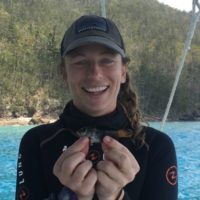Katie Sievers
PhD Graduate
James Cook University

From 2005 to 2022, the main node of the ARC Centre of Excellence for Coral Reef Studies was headquartered at James Cook University in Townsville, Queensland (Australia)








Katie grew up in California, and began her marine biology career as an undergraduate student at the University of California, Santa Barbara, and learned to dive in the cold water of the Channel Islands. After a few years of diligently volunteering, Katie received an opportunity to go to Moorea, French Polynesia as a field assistant. That experience solidified her desire to continue on the marine biology path. After finishing her undergraduate career, she began her Masters research at San Diego State University in the fish ecology lab. Her research combined field work, remote sensing, and spatial analysis to explore how the spatial configuration of kelp forest rocky reef habitat alters fish population dynamics. Upon completing her masters, Katie returned to the tropics and received a US Fulbright Fellowship to conduct research in the Philippines. There, she was introduced to JCU researchers, and was inspired to use the Fulbright as a jumping off point to begin her PhD. Throughout her PhD under the supervision of Prof. Garry Russ and Dr. Rene Abesamis, Katie explored the effects of multiple habitats types on tropical reef fish population and community dynamics, with a particular focus in how multiple habitat types may alter coral reef No-Take Marine Reserve performance in the Philippines.
New DNA techniques are being used to understand how coral reacted to the end of the last ice age in order to better predict how they will cope with current changes to the climate. James Cook Univer
A new study on the effects of climate change in five tropical countries has found fisheries are in more trouble than agriculture, and poor people are in the most danger. Distinguished Profess
James Cook University researchers have found brightly coloured fish are becoming increasingly rare as coral declines, with the phenomenon likely to get worse in the future. Christopher Hemingson, a
Researchers working with stakeholders in the Great Barrier Reef region have come up with ideas on how groups responsible for looking after the reef can operate more effectively when the next bleaching
Abstract: As marine species adapt to climate change, their heat tolerance will likely be under strong selection. Individual variation in heat tolerance and its heritability underpin the potential fo
Abstract: The Reef Ecology Lab in KAUST’s Red Sea Research Center explores many aspects of movement ecology of marine organisms, ranging from adult migrations to intergenerational larval dispersal
Abstract: Macroalgal meadows are a prominent, yet often maligned component of the tropical seascape. Our work at Ningaloo reef in WA demonstrate that canopy forming macroalgae provide habitat for ad
Abstract: Sharks are generally perceived as strong and fearsome animals. With fossils dating back at least 420 million years, sharks are not only majestic top predators but they also outlived dinosa
Abstract: Connectivity plays a vital role in many ecosystems through its effects on fundamental ecological and evolutionary processes. Its consequences for populations and metapopulations have been
Abstract: Evolution of many eukaryotic organisms is affected by interactions with microbes. Microbial symbioses can ultimately reflect host’s diet, habitat range, and even body shape. However, how
Abstract: The past few years have seen unprecedented coral bleaching and mortality on the Great Barrier Reef (GBR) but the consequences of this on biodiversity are not yet known. This talk will expl